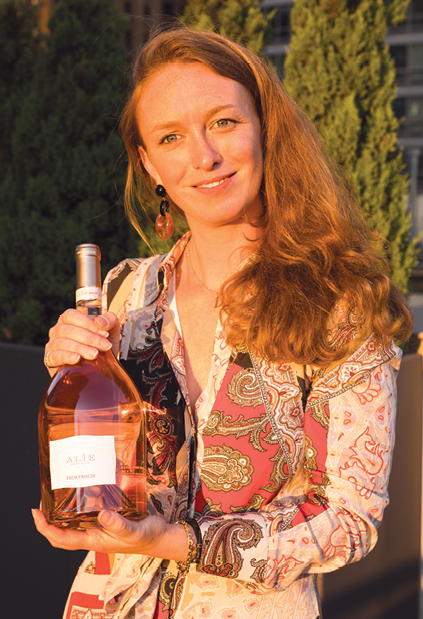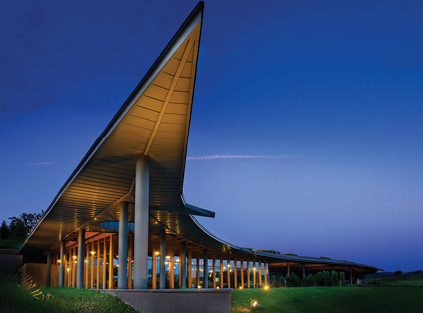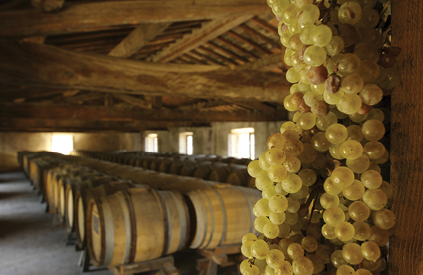- Home
- Media Kit
- Current Issue
- Past Issues
- Ad Specs-Submission
- Ad Print Settings
- Reprints (PDF)
- Photo Specifications (PDF)
- Contact Us

![]()
ONLINE


Livia le Divelec with a bottle of Alìe wine
Cultivating
Toscana Diversity
Editors’ Note
Livia le Divelec has been a winemaker for Frescobaldi Toscana since September 2014 and its Brand Ambassador since January 2017. Previously, she was the wine department coordinator at Florence University of the Arts. She holds a degree in viticulture and enology from the University of Florence.
Company Brief
The Frescobaldi family has a 700-year-old history of making wine in Tuscany. Frescobaldi Toscana’s (en.frescobaldi.com) vision is to be the reference producer of Tuscan fine wines and exclusively dedicated to exalt the diversity of its terroirs. Frescobaldi produces wine at its seven estates in Tuscany – Tenuta Perano, Castello Nipozzano, Tenuta CastelGiocondo, Tenuta Castiglioni, Castello Pomino, Tenuta Ammiraglia, and Rèmole – and distributes it to discerning customers worldwide.

The Piero Sartogo designed wine cellar at
Tenuta Ammiraglia in Magliano, Toscana
Will you highlight the history and heritage of Frescobaldi Toscana and how the business has evolved?
The Frescobaldi family has a long history in Tuscany. In the medieval era, they started in the very center part of Tuscany, in the Appalachian currently called Chianti Montespertoli. They first started wine production at Tenuta Castiglioni 700 years ago. Later on, they spread to the Northern part of Tuscany and then also to Montalcino. They then moved toward the sea with Tenuta Ammiraglia, where we are producing the Alìe wine. Finally, last October, we entered the Chianti Classico area, which is very important.
We are involved in important work in Tuscany and one of our focuses is to build value at every single estate. Each estate has its own team of experts and its own cellar where we process grapes. This is part of a long tradition but, of course, we are becoming even more contemporary year after year. While it’s important to remain loyal to tradition, we also have to look beyond our current horizons. Alìe is an example of this philosophy.
Does Frescobaldi Toscana distribute its wines globally or is it customized based on the brand?
We have a general focus, but also try to personalize it for the culture that exists in each country where we may face different types of approaches to wine. With seven estates in Tuscany, our production is substantial. We have many wines within our portfolio, although they of course do not all have the same importance, but we still try to export from each estate to markets all over the world.

The aging room at Castello Pomino in Pomino, Tuscany
Is technology impacting the wine-making process or is it still about handcraftsmanship?
We are focused on technology. The secret of our production is that we can really mesh our traditional methods and our technology knowledge. For our historical wines, we perhaps concentrate more on tradition, but there are other wines for which we have to understand the latest technology and apply it to our production.
We pay close attention to the vineyards 365 days a year and there is a lot of technical knowledge being applied there that is making the difference in terms of taste. For example, producing a red wine is probably easier than producing a white wine or a rosé wine where more attention must be paid to the details. With red wine, we use the skins which have natural antioxidants. When we are producing a rosé or a white wine, you are immediately separating out the skins.
Therefore, technology is important in the production process, however the human factor remains equally as important. As winemakers, we have to evaluate which techniques to use or not to use for a particular sort of terroir because, in the end, it is the wine that will be telling the story and sharing the culture of that specific piece of land.
Given all of the variations in regard to climate and the terroir, are you able to accurately predict how a new release will turn out or are you still surprised at the end of the process?
We have to be able to read the harvest in advance because we get totally different climatic conditions every single year. What makes the difference is checking your vineyards and your single vines day after day. We actually run in between the wires checking our grapes and our production. If we work this way, we can produce quality grapes and quality wine can be extracted and processed in the cellar.
Will you discuss Frescobaldi’s commitment to the environment and sustainability and how important this is to the company?
For us, it’s a state of mind. It’s an ethic of production. In the last year, for example, we were introducing ancient techniques, but in a more modern way such as the sowing of essences in the soil. That way we can better control the natural fertility of the soil and porosity. All of these were really ancient agricultural techniques that we reintroduced into our philosophy and our mentality. We are working to control nature in the most natural way possible.
Was wine making something that you knew at a young age you wanted to do?
My father was a wine producer and I am the youngest in my family and I was the only one who decided to follow in the agricultural aspects. I fell in love with this when I was a child because I was curious about what was happening. Every winter the leaves fall off, but what is happening in the tree? What about the leaf? Why in springtime, when the temperatures are rising up, does life start again? I was very curious about it.
What makes Frescobaldi such a special company for you?
They are in love with what they do and they transmit this to everyone around them. This motivates you to do your best. Since it’s an important brand and really well-known worldwide, I have the chance to meet different people in the wine business and better understand the culture of wine all over the world, which is really interesting.![]()